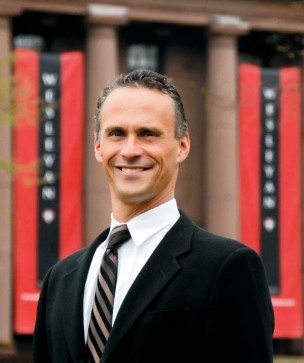
On Friday, June 20, President Michael Roth will accept the 2014 Benjamin E. Mays award from A Better Chance Foundation (ABC). The Foundation’s mission is to help young people of color become educated and experienced in responsibility and leadership.
“We carry out our mission through our signature College Preparatory Schools Program, which annually recruits, refers and supports about 500 A Better Chance Scholars at more than 300 of the nation’s leading boarding, day and public schools,” the ABC website reads.
President Sandra Timmons of ABC Foundation described the award President Roth will be accepting on behalf of the University.
“The Benjamin E. Mays award is named after the historic educator…who was for many years at Morehouse College, and we give it really to an educator who really exemplifies what the vision of a better chance is in terms of providing access to future leaders and challenging young people at the highest level,” Timmons said.
The University has had the second-highest number of scholarships from ABC. Roth elaborated on the school’s relationship with ABC Foundation and his commitment to the organization since he began working at the University.
“For years, Wesleyan has been committed to working with community-based organizations, who find great students who can’t afford to pay the tuition, but who can knock the ball out of the park in areas of the curriculum that they’re interested in,” Roth said. “And so, what we’ve tried to do since [I’ve been at Wesleyan], is accentuate our work with community-based organizations and add to the partners we have.”
Associate Dean of Admission Clifford Thornton described the University’s desire to maintain a relationship with ABC Foundation.
“Certainly, if we could grow that list, we would be delighted because the students bring unique talent to the school,” Thornton said. “And the other thing is that ABC has changed over the years in that it is a more diverse population than was the case in the past. The ABC population was primarily black and Latino students. We now see a small, but noticeable growth in students that are of Asian descent, which was not the case in the past, and that’s a good thing.”
Timmons reiterated ABC Foundation’s similar goal to continue working with the University due to the success scholars have had.
“We hope we continue to send many students there and that they’re an active part of the campus,” Timmons said. “We’ve had a number of alums who have come out [of the University] who are quite successful, we have students there who are showing themselves to be leaders in the environment there, so I think that we certainly hope for an expanded…continuation. It’s been a great relationship.”
ABC allows the University to matriculate qualified applicants whom it normally would not be able to admit due to the restrictions of the financial aid budget.
“At Wesleyan, as you know, we don’t have an unlimited financial aid budget so targeting our financial aid dollars where they do the most good often means working with partners who help us identify great applicants who will benefit dramatically from the financial aid we offer,” Roth said.
The application process for an ABC Foundation scholar is the same as for any other prospective University student, but Thornton said that the relationship with ABC is an outstanding characteristic.
“I don’t think that what we look for in ABC is any different from any applicant. But certainly their affiliation with ABC is a distinguishing characteristic,” Thornton said. “But in terms of what we look for in academic credentials, the answer would be the same for a student who is not connected with a community-based organization.”
Roth spoke to the value of education and how he believes it should not be restricted to merely the people who can afford to pay for University.
“I do think…education is absolutely key for social mobility and restrictions on education ossify the privileges of the rich so that they can continue to lord it over everyone else and these tendencies have existed in America as much as they ever existed in our history now,” Roth said.
Roth believes that ABC Foundation helps to combat this issue through its success in finding young scholars with potential.
“The sense that wealthy people somehow are entitled, that the descendants of the wealthy people are entitled to their advantages is such an important ideology now among the elite and education,” Roth said. “[The ABC Foundation] is the antidote to that because you find really smart people who don’t have wealth…they will show what they can do when they have the tools of education to work with after they graduate.”
Thornton spoke about the impact ABC Foundation has had on the University and its reputation as being especially diverse and welcoming.
“[Wesleyan being a] national leader in this area of diversity, particularly ethnic racial diversity, would not be possible if not for Wesleyan jumping on board early with some of these organizations,” Thornton said. “ABC…allowed Wesleyan to not only develop a reputation as a place that was welcoming to students from under-represented groups but also to [allowed] Wesleyan to develop…I think Wesleyan [becoming known as] Diversity University would not have been possible without organizations such as ABC.”


Leave a Reply